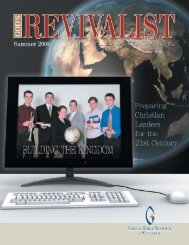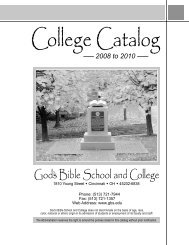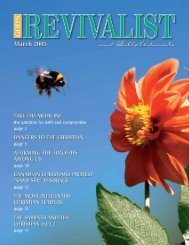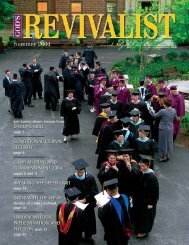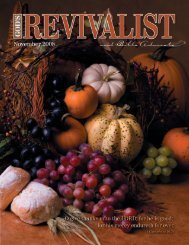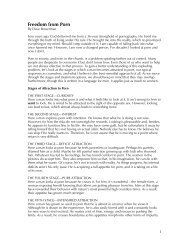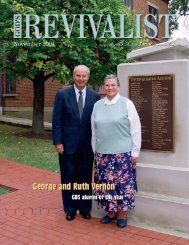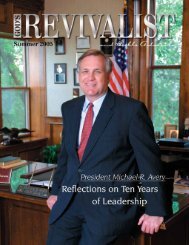Download the October Issue - God's Bible School & College
Download the October Issue - God's Bible School & College
Download the October Issue - God's Bible School & College
You also want an ePaper? Increase the reach of your titles
YUMPU automatically turns print PDFs into web optimized ePapers that Google loves.
Today’s gasoline crunch teaches us a lot<br />
about Christian stewardship and<br />
simplicity….<br />
GASOLINE<br />
AND<br />
GOD<br />
by Michael Williams<br />
In recent weeks throughout our nation,<br />
people have been both alarmed and<br />
depressed by <strong>the</strong> skyrocketing price of<br />
gasoline. Like countless o<strong>the</strong>rs, I have tried to<br />
eliminate any unnecessary driving, coordinate and combine<br />
errands to avoid backtracking, and even go online<br />
looking for <strong>the</strong> cheapest possible gas in <strong>the</strong> Indianapolis<br />
metropolitan area. And I’m sure I have occasionally<br />
complained and grumbled my frustration to anyone<br />
within earshot.<br />
And while <strong>the</strong> gas crisis is a matter of concern, and<br />
<strong>the</strong> burden created is real indeed, it is not necessarily<br />
all bad. In fact, it may actually be most beneficial if it<br />
serves to remind us of <strong>the</strong> importance of two distinct<br />
but related biblical principles. The first of <strong>the</strong>se is stewardship.<br />
The <strong>Bible</strong> teaches us that this is our Fa<strong>the</strong>r’s<br />
world, but that He has specifically appointed man as<br />
His steward over nature. As such, one of our responsibilities<br />
is to husband earth’s resources, not wantonly to<br />
waste <strong>the</strong>m or misuse <strong>the</strong>m. We are to consider and<br />
conserve, calculate and control. While Christians<br />
should not go to extremes in overemphasizing this principle,<br />
yet nei<strong>the</strong>r should <strong>the</strong>y be oblivious to, nor inactive<br />
in, its application. Can we and should we become<br />
better stewards Undoubtedly.<br />
The second biblical principle brought into sharp<br />
relief by <strong>the</strong> gas crunch is that of simplicity. A number<br />
of Scriptures, such as I Timothy 6:8, Hebrews 13:5, and<br />
Mat<strong>the</strong>w 6:33, admonish us to <strong>the</strong> virtue of simplicity.<br />
Ours is an age of opulence and excess. We are given<br />
visual tours of <strong>the</strong> homes of <strong>the</strong> rich and famous and<br />
regaled with intriguing accounts of how <strong>the</strong>y live, <strong>the</strong><br />
places <strong>the</strong>y vacation, etc. In a materialistically mad<br />
world, we do well to remember that we, as followers of<br />
<strong>the</strong> lowly Nazarene, who had only disdain for this<br />
world’s goods, do not have always to have <strong>the</strong> biggest<br />
and <strong>the</strong> best, <strong>the</strong> finest and <strong>the</strong> fastest.<br />
Every area of<br />
our lives should be governed<br />
by modesty and simplicity.<br />
Just because I can does not necessarily mean I should!<br />
There is a real sense—a spiritual sense—in which less<br />
becomes more, and more impoverishes us immeasurably.<br />
John Wesley certainly reflected <strong>the</strong> dignity of simplicity<br />
when he admonished his people to “earn all you can, save<br />
all you can, and give all you can.” When it comes to an<br />
automobile, it is for some simply a means of transportation;<br />
but to o<strong>the</strong>rs, it can and does become much more.<br />
Indeed, it easily morphs into a “gas-guzzling god” that<br />
consumes one’s attention, wastes precious time and<br />
money, and elevates carnal pride.<br />
The important thing in all of this is that we not<br />
become distracted by <strong>the</strong> gasoline crisis or any o<strong>the</strong>r<br />
problem, whe<strong>the</strong>r it is economic, social, or political.<br />
This is not to say that we should be oblivious to those<br />
that affect our lives, but we should not become obsessed<br />
by <strong>the</strong>m. Our focus needs to remain fixed upon God, on<br />
being His people, and doing His work in this world—<br />
this in spite of what is happening in <strong>the</strong> world, our<br />
nation, or our neighborhood. To reiterate, <strong>the</strong> greatest<br />
needs are never economic or political but are moral and<br />
spiritual. Our eyes—and our hearts—need to be<br />
focused primarily and continually on spiritual reality.<br />
So <strong>the</strong> next time I fill up my tank, I may still wince<br />
or even grumble a little, but I purpose to do a spiritual<br />
“gut-check” in order to be sure that my focus is ultimately<br />
not on <strong>the</strong> erratic gas prices at <strong>the</strong> pump but on<br />
<strong>the</strong> eternal God.<br />
Rev. Dr. Michael R. Williams is a GBS graduate (’66 ThB; ’70 BA) and<br />
former faculty member. He is senior pastor at Union Friends Church,<br />
Westfield, Indiana, and is <strong>the</strong> newly elected Superintendent of <strong>the</strong><br />
Central Yearly Meeting of <strong>the</strong> Friends Church. Reprinted with permission<br />
from The Friends Evangel.<br />
OCTOBER 2006<br />
09





